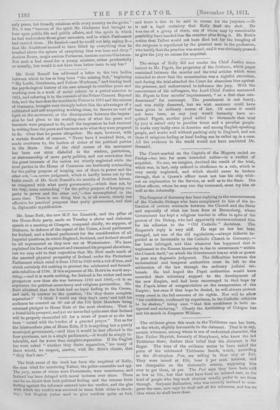Mr. Scott Russell has addressed a letter to the two
bodies between which he has so long been "the missing link," beginning "14 Lords, Gentlemen, and Fellow-Workmen," and tracing back the psychological history of his own attempt to combine peers and working-men in a work of social reform to a period anterior to 1851, and referring it to the counsels of the Prince Consort. Beyond this, and the fact that the troubles in France in 1870 and the success of Germany, brought very strongly before him the advantages of a cultivated and self-respecting working-class, he throws no sort of light on the movement, or the discrepancies between the impres- sion he had given to the working-men of what the peers and baronets were prepared to do, and the impression he had received in writing from the peers and baronets as to what they were prepared to do. Over that he passes altogether. He says, however, with a certain flourish of manner, "Never have I received from, or made overtures to, the leaders of either of the political parties in the State. One of the chief causes of the movement has been our utter disbelief in the wisdom, patriotism, or statesmanship of mere party politics, and our conviction that the great interests of the nation are utterly neglected while the rival parties in the House of Commons are factiously contending for the paltry purpose of keeping one of them in power and the other out,"—a severe judgment, which is hardly borne out by the futile result of Mr. Scott Russell's six mouths of fruitless labour, as compared with what party government,—which does not, by the way, mean contending "for the paltry purpose of keeping one party in power and the other out,"—has accomplished in the same time. There is one thing that is, at all events, clearly less effective for practical purposes than party government, and that is, diplomatic mystification.


































 Previous page
Previous page